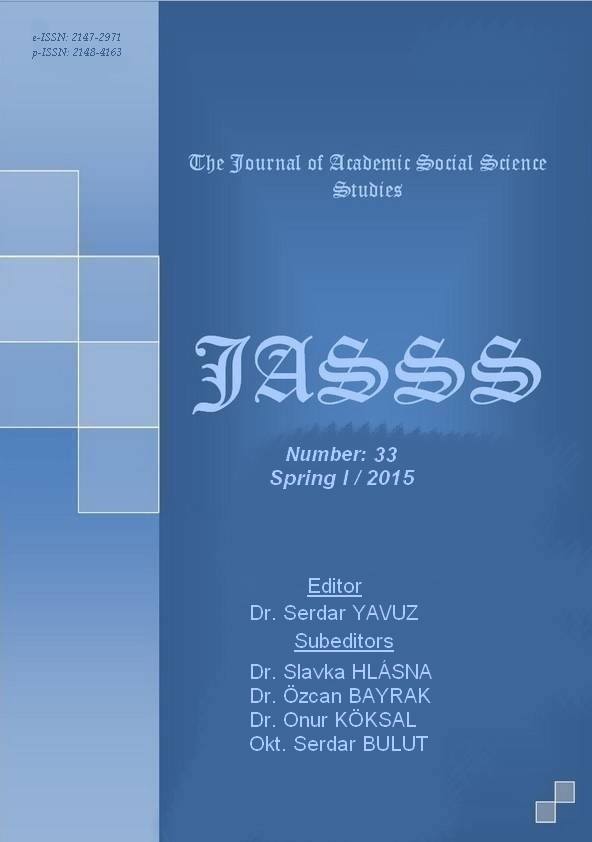İLKOKUL ÖĞRETİM PROGRAMLARININ UYGULANMASINDA OKUL YÖNETİCİLERİNİN GÖREV VE SORUMLULUKLARINA İLİŞKİN OKUL YÖNETİCİLERİNİN VE ÖĞRETMENLERİN GÖRÜŞLERİ
Author :
Abstract
Bu çalışmanın amacı; ilkokul öğretim programlarının uygulanmasına yönelik okul yöneticilerinin görev ve sorumluluklarına ilişkin okul yöneticilerinin ve öğretmenlerin görüşlerini belirlemektir. Bu çalışma, betimsel araştırma modelinde nitel bir araştırmadır. Araştırmada nitel araştırma yöntemlerinden görüşme tekniği kullanılmıştır. Araştırma, Sivas İli Merkez İlçede yer alan okullarda görev yapan 15 ilkokul yöneticisi ve 20 sınıf öğretmeni ile yürütülmüştür. Araştırmaya veri toplamak amacıyla araştırmacı tarafından “Okul Yöneticisi Görüşme Formu” ve “Öğretmen Görüşme Formu” geliştirilmiştir. Veri analizi sürecinde içerik analizi yöntemi kullanılmıştır. Araştırma bulgularına göre; okul yöneticilerinin yüksek düzeyde öğretim programları hakkında yeterli bilgiye sahip olduklarını düşündükleri; okul yöneticilerinin öğretim programlarının uygulanmasına yönelik görev ve sorumluluklarını en çok “araç gereç ve materyal sağlama, hazırlanan planları onaylama ve programın uygulanmasını denetleme” olarak gördüğü sonuçlarına ulaşılmıştır. Ayrıca okul yöneticileri ve öğretmenlerin görüşlerine göre; okul yöneticilerinin öğretim programlarının planlamasına yeterince katkı sağlamadığı, öğretmenler ile okul yöneticilerinin öğretim programlarının uygulanması için gerekli olan araç-gereç konusunda sorun yaşamadığı, ancak okulların fiziki imkânlarını yetersiz olarak değerlendirirken okul yöneticilerinin çoğunun öğretim programlarının değerlendirilmesine ilişkin herhangi bir çalışma yapmadığı ve okul yöneticilerinin öğretim programının denetimini en çok “dersleri gözlemleyerek” gerçekleştirdikleri, bunun yanı sıra “sınıf defteri kontrolü” ve “öğretmenlerle görüşme yaparak” bu denetimi gerçekleştirdikleri bulgulanmıştır. Araştırma sonuçlarına göre; okul yöneticilerinin öğretim programlarının planlama sürecine daha aktif katılmaları, okulların fiziki olanaklarının iyileştirilmesi, okul yöneticilerinin öğretim programlarının değerlendirilmesi sürecine katkı sağlamaları ve değerlendirme sonuçlarını üst makamlara bildirmeleri önerilmiştir.
Keywords
Abstract
The aim of this study is to determine school administrators’ and teachers’ views as regard to school administrators’ duties and responsibilities in applying primary school curriculum. This is a qualitative study in descriptive research model. Of qualitative research methods and interview techniques were used in this study. The study group consists of 15 primary school administrators and 20 class teachers working at schools in central districts in Sivas. In line with the information obtained from document analysis, ‘Administrator Interview Form’ and ‘Teacher Interview Form’ were developed by the researcher. The data were obtained by sound recording during the interview. Content analysis was used during the data analysis process. Some of the conclusions obtained from the study are the following: a great many school administrators think they have enough knowledge about the curriculums; school administrators regard their duties and responsibilities on applying curriculums as providing equipment, approving the prepared plans and supervising the application of curriculum. In addition, school administrators and teachers think school administrators do not make enough contribution to planning curriculums; teachers do not have problem on equipment necessary for the application of curriculum; however, they claim the physical conditions of schools are inadequate; most of the school administrators do not make any work as to evaluating curriculum; school administrators and teachers consider that school administrators carry out the supervision of curriculum by observing the classes most; furthermore, they also carry out these supervisions by checking teachers’ class book and interviewing with the teachers. According to research results, it has been suggested that school administrators should participate in the process of curriculum planning more actively, the physical conditions of schools should be improved, school administrators should contribute to the assessment process of curriculum and they should inform the results to top level.





